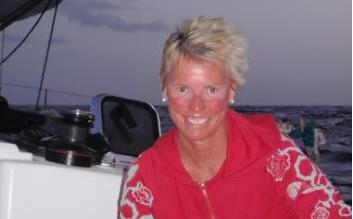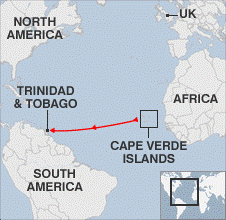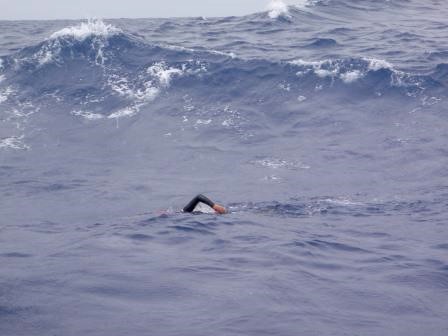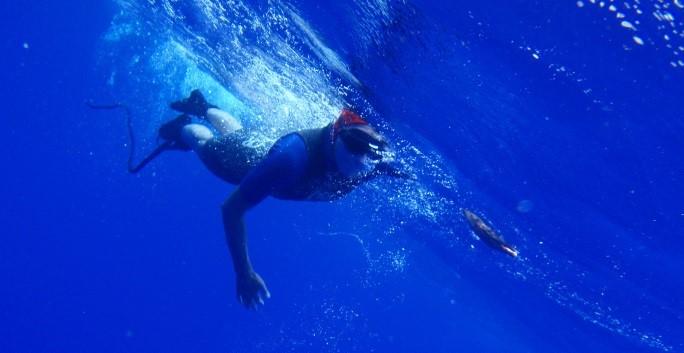|

|
|
Jennifer Figge
Endurance athlete and record-holder
|
Jennifer, you have become the first woman to swim the Atlantic, crossing the ocean in 24 days (1).
Why did you want to cross the Atlantic?
The idea came in 1964, when I was eleven years old and flying over the Atlantic to visit my mother (the opera singer Margherita Roberti) who was living in Milan. I simply told my mum that I wanted to swim in the middle of the ocean … of course this idea created a lot of turbulence. Just imagine - my mother thought that people who sailed the ocean were crazy to take the risk.
I used to sail a lot with my father, who unfortunately died from cancer, and I committed myself to do what my dad dreamed of, but could not do.
Indeed, later on I could feel for the first time the voice of my father helping and comforting me during my Atlantic crossing in 2009.

In 2013 I completed my fourth crossing of the Atlantic, I swam a total distance of 257.5 nautical miles (477 km) over the course of 32 days. I departed from Cape Verde (417 miles off the coast of West Africa) on April 8th and landed on the shores of Antigua in the Caribbean Sea on May 9th 2013.
Please describe one of your days crossing the oceans
I have breakfast around seven o’clock and I eat potatoes and pasta with parmesan cheese. At nine o’clock I jump into the water and I normally swim daily for six hour blocks of time, till four or five o’clock. It depends on the weather conditions and also on the sun and light.
Jennifer, you have also swum in the Pacific Ocean, is that different to the Atlantic?
Oceans have different tastes, even the salinity of water is not the same. The Pacific has no river waters mixing in, while the Atlantic - approaching South America – gets water from the Amazon.
My love is the Atlantic, it’s like my home.
What helps you to keep swimming in the difficult moments? What did you think in those dangerous situations? What motivates you?
|
In such cases I used to think about the challenges my family had had to face: my uncle lost a leg in an accident, my cousin was critically burnt in an airplane crash and my father died of cancer …
And I said to myself: “Lucky me, Jennifer, I am just swimming ! “
I believe in God and I am a Roman Catholic. When I leave for these endurance swims I take some Holy water with me from my church in Aspen (Colorado) and a little Madonna that my mother had in Italy, a little painted wood medal of Madonna.
I guess in dangerous situations I felt motivated to challenge myself perhaps because some of my friends faced difficult situations, while I did not have so many challenges in my life. I have had a very lovely life, I am fortunate.
|
 |
| Jennifer Figge swimming in the Atlantic |
Would you like to share with us some anecdotes from your swims?
In February 2011 I was swimming in the Pacific in the period when whales migrate and it happened that, I was followed by a twenty foot baby whale. It looked like the shadow of a small airplane. The crew pulled me onboard as quickly as possible and the whale continued to follow us for three hours. It was amazing!
I remember that once when I was swimming the rough waters of the Straits of Bonifacio in the Mediterranean, approaching my destination I noticed my husband, who was on the support boat. He kept looking at his watch because we had to catch a plane and he was showing me that I was late. We made the plane!
Are you planning to write a book about your epic swims? (Or maybe someone will make a film or TV programme about it?)
I keep diaries for every crossing and maybe one day I could write a book. The current plan is to make a video graphic documentary titled “Woman overboard” (2).
What has inspired you to prioritise sport in your life?
You will be surprised to know, Alessandra, that I used to smoke cigarettes till 26 years ago when my seven year old son Alexander asked me to stop; so I substituted cigarettes with sport … Maybe it was my mother who suggested to my son that he asks me to quit smoking, promising him whatever present for his birthday … joking!
I read that you were a marathon runner before or maybe you still are. Which are the key analogies/ differences between running and swimming in your opinion?
Yes, it’s true and I ran several marathons over ten years. Running was fascinating, but I was ready for a new challenge … probably this is one secret of success: the ability to switch over.
Comparing swimming and running, I think that the main difference is that while swimming you need more concentration, while you are running, you can let your mind wander.
What is the difference in sport between being courageous /brave and running serious risks? Do you think this difference is the same for all sports, or does it vary according to which sport you are looking at?
 I like this question, Alessandra!
I like this question, Alessandra!
My son Alexander is a racing car driver and he said to me about his profession: “Mum, why do you worry about me in the car when you are swimming with sharks?“ And my response was, “The sharks are only going 2 miles per hour!”
If you just compare the frequency of shark attacks on the California coast to the frequency of automobile accidents in California, you easily conclude that people are safer in the ocean.
I am very cautious when swimming in the ocean, we cannot control an ocean, we respect the wind limits, otherwise I could wander far off course and get lost.
Endurance swimming is a team sport, I could not accomplish my swims without my crew, they do all the work and I have the fun. I am constantly supported by my crew and the captain is in charge of assessing all risks. A doctor is part of the crew and we have on board the necessary rescue equipment (defibrillator, electrocardiograph, etc.). We are aware that in case of an emergency a helicopter cannot reach us beyond 150 miles (around 240 km) … then we are on our own.
It’s a matter of choice, you can always swim in a pool … if you want to be in flat water.
Which are and have been the key factors of your success?
I believe the secret is that I do listen to my own inner voice, I do not pay too much attention to the big challenges, I just go. Actually, Alessandra, if I had listened to others I would have not started running … I mean, I do not want to hear the negativity: being confident is essential.
I probably started learning to be confident because my mother moved to Italy for seventeen years to pursue her career as an opera singer in the 1950s when I was three; I was raised by my father and I thought everything was possible, I also acknowledge the importance of my mother’s brilliant career – she was a great role model. My father pushed me, this was unusual in the 50’s: “Jennifer, she has to go! “ For a man to do that in the 50’s, you know, it was unusual.
I guess I inherited the endurance from my father and my adventurous spirit from my mother.
Which are, in your opinion, the challenges to success that professional or sports women face nowadays?
The first woman who swam the English Channel was American Olympic champion Gertrude Ederly – the Queen of the Waves - in 1920s, it is amazing to read her story.
I think that there are more opportunities for women nowadays, but there is still an important challenge: women need to believe in themselves, as I did.
The family’s attitude might sometimes represent a challenge as far as they fear for their members’ safety; my mother, for instance, would prefer me to write a book, safer than swimming. On the contrary my husband, who is a sports person (he loves bird hunting), has always been very supportive, he is my sponsor. He has been on the boat during some crossings, but not in the Atlantic; when he is not with me, we talk via satellite phone.
Which are the two main pieces of advice you would give to a young woman, who wants to develop a sports career?
First of all I suggest that they find a sport that brings them joy. Secondly I recommend not being afraid of trying sports where they think they will not be the best: there is no need to be the best, they should do what they like and what they want to do.
What I like is swimming, for me the “romance”, is in the middle of the ocean, not only the final goal: actually, I do not like to see the end of the crossing, the land, the completion …
| Short Biography |
|
Things You Need To Know About Jennifer Figge
- In ten years, from 1985 – 95 she ran seven marathons and five ultra-marathons. She ran across two states (Iowa and Illinois), six countries (France, Romania, Thailand, India, Mexico, Iceland), and South America (Chile and Argentina).
- She just turned 61 in November 2013 but is agelessly giddy.
- Jennifer lives in Aspen, CO and trains in a pool at the Maroon Creek Club. “I like training at altitude in the cold and snow,” she says.
- She didn’t swim across the Atlantic. She completed three Atlantic Crossings, swimming daily for up to 8 hours a day, accompanied by “Jamie” a 42′ catamaran and a 5-person crew, including a rescue diver and a doctor.
- Despite widespread erroneous reports, Jennifer Figge did not swim across the Atlantic inside of a shark cage. The shark cage lasted all of one hour. She swam the rest of the journey un-tethered to the boat with tremendous risk of being separated from them.
- In 2009 during her first Atlantic Crossing, her longest consecutive swim was 28 nautical miles. To put that in perspective, the Ironman Triathlon distance is 2.4.
- During her first Atlantic Crossing Jennifer swam in seas up to 30 feet and the only way for her to be safely returned to the boat was with the assistance of a rescue diver
- Jennifer’s son Alex is a professional racecar driver.
http://jenniferfigge.com/?page_id=2
Contact Details
Jennifer Figge
http://jenniferfigge.com/
|
REFERENCES
.png)
.png)